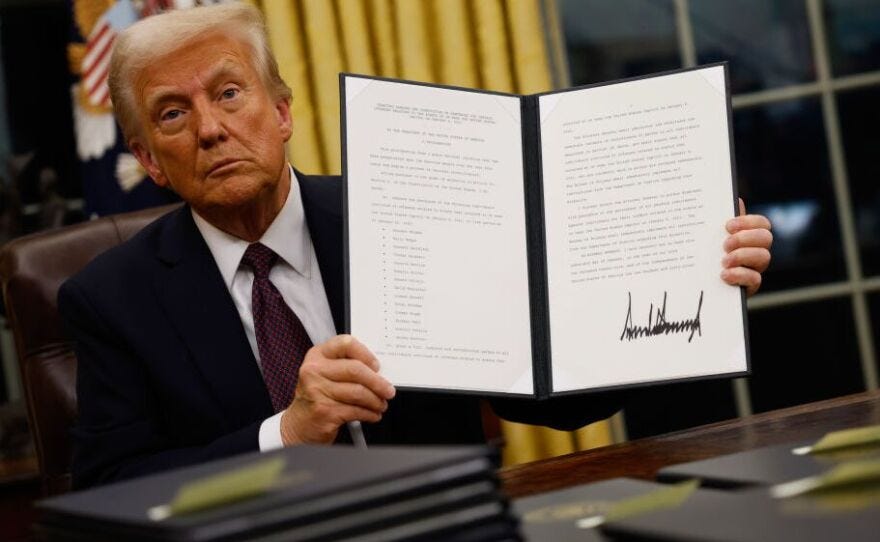Trump’s Bold Visa Stance: Obesity as a Hidden National Security Risk
In a move that’s sparking fierce debate across the globe, the Trump administration has issued new guidance to U.S. embassies, empowering visa officers to deny or revoke immigrant visas for applicants deemed obese or carrying other health conditions like diabetes that could burden public resources.
Announced on November 7, 2025, this directive—obtained by KFF Health News and reported widely—flags obesity as a potential “public charge” risk, citing its links to costly comorbidities such as asthma, sleep apnea, high blood pressure, and cardiovascular disease.
The policy doesn’t impose a strict BMI cutoff but urges consular staff to scrutinize applicants’ health profiles, projecting long-term medical expenses that might strain taxpayer-funded systems like Medicaid.
This isn’t mere gatekeeping; it’s framed as a pragmatic safeguard for America’s fiscal and societal health. With global obesity rates hovering at 13% among adults—yet soaring to 42% in the U.S.—the administration argues that unchecked immigration of at-risk individuals exacerbates an already ballooning crisis. But beyond economics, proponents whisper a graver concern: national security. In an era of escalating geopolitical tensions, could a nation’s collective waistline undermine its defenses? The science suggests yes—and it’s time we confronted it head-on.
At its core, obesity isn’t just about extra pounds; it’s a metabolic saboteur that erodes cognitive sharpness, the very fuel of competence in high-stakes roles like intelligence analysis, military strategy, or even diplomatic negotiation. When fueled by poor diets—high in processed sugars and fats—and sedentary habits, the body’s metabolism falters. Insulin resistance spikes, chronic inflammation surges, and blood flow to the brain constricts, starving neurons of oxygen and nutrients. This isn’t speculation; it’s backed by decades of research.
Longitudinal studies paint a stark picture. A landmark 18-year analysis of 1,423 healthy adults found midlife obesity slashed cognitive performance, particularly in executive functions like decision-making and problem-solving—skills essential for national security operatives.
Brain imaging reveals why: Obese individuals show accelerated gray matter atrophy in the hippocampus and prefrontal cortex, regions governing memory and impulse control. A UK Biobank study of over 30,000 participants linked higher BMI to reduced gray matter volume, white matter hyperintensities (early stroke markers), and plummeting fluid intelligence scores—measuring raw reasoning ability. Even in young adults, obesity correlates with deficits in attention, working memory, and impulsivity, per a cross-sectional study of women aged 18-35.
Mechanistically, it’s a vicious cycle. Excess adipose tissue releases adipokines—pro-inflammatory cytokines—that breach the blood-brain barrier, fostering neuroinflammation akin to early Alzheimer’s pathology. Vascular changes compound this: Atherosclerosis from obesity narrows cerebral arteries, impairing cognition much like a slow-motion blockade. Meta-analyses confirm midlife obesity doubles dementia risk, with executive function hit hardest—14 of 15 cross-sectional studies show impairments independent of age or comorbidities. In children, the damage starts early: Overweight kids with belly fat underperform on relational memory tasks, priming a generation for cognitive vulnerabilities.
Now, translate this to national security: A workforce—immigrant or native—hobbled by foggy thinking is a liability. The U.S. military already grapples with obesity disqualifying 27% of youth recruits, costing $1.3 billion yearly in healthcare and lost productivity for service members alone. Obese soldiers face 33% higher musculoskeletal injury rates, eroding unit readiness.
Broader threats loom: Immunologic dysfunction from obesity heightens pandemic vulnerability, while economic drains—$170 billion annually in U.S. healthcare—siphon funds from defense. Experts like those at the Heritage Foundation warn that in a new Cold War with China, an obese populace undermines lethality and innovation. Denying visas to those whose conditions signal cognitive decline isn’t cruelty—it’s foresight, ensuring newcomers bolster, not burden, America’s strategic edge.
Yet, here’s the irony that demands scrutiny: If obesity dulls the mind and endangers security, why does the mirror reflect the same flaws in the halls of power? The Trump administration’s own ranks—and the federal government at large—mirror the nation’s 40% adult obesity rate, per CDC data. High-profile figures, from cabinet secretaries to congressional leaders, visibly struggle with weight, their schedules jammed with fundraisers over farmer’s markets. This isn’t finger-pointing; it’s a call for consistency.
Policymakers decry “public charges” abroad while embodying metabolic risks at home—hypocritical when their decisions shape global security. A 2023 TFAH report notes 22 states exceed 35% obesity among adults, including strongholds of both parties, yet federal wellness programs lag, with USDA initiatives like HealthierUS underfunded.
The federal response to obesity has been piecemeal: HHS’s Steps to a Healthier US promotes activity, but without teeth, rates climb. Critics argue this selective scrutiny—tough on immigrants, soft on elites—breeds resentment and erodes trust. If the administration is serious, it must lead by example: Mandate executive fitness assessments, subsidize gym access for staff, and model the metabolic discipline it demands of visa seekers. Only then can this policy transcend optics and truly fortify the nation.


